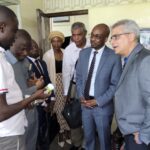In a recent statement, Secretary General Gerson Msigwa announced the development of a comprehensive plan by his Ministry, in collaboration with the Ministry of Health, to conduct nationwide exercises aimed at addressing non-communicable diseases (NCDs) among Tanzanians. This initiative serves to illustrate the government’s dedication to enhancing public health and mitigating the impact of diseases such as diabetes, hypertension, and cardiovascular conditions.

The announcement was made on 23 June 2024, during the celebration of International Yoga Day in Dar es Salaam, Tanzania. The event, which encourages physical activity and mental well-being, provided an appropriate setting for the Secretary-General’s declaration. The selection of this occasion serves to emphasise the significance of integrating physical exercise into daily routines as a preventative measure against non-communicable diseases (NCDs).
The Growing Burden of Non-Communicable Diseases
Non-communicable diseases have emerged as a significant public health challenge in Tanzania, mirroring a global trend. These diseases, frequently associated with lifestyle factors such as poor dietary habits, a lack of physical activity, and tobacco use, account for a considerable proportion of morbidity and mortality in the country. The data provided by the Ministry of Health indicates a concerning increase in the prevalence of non-communicable diseases (NCDs), which requires immediate and coordinated action.
A Collaborative Approach
The Secretary-General, Msigwa, underscored the collaborative nature of the initiative, which involves a multitude of stakeholders, including government agencies, healthcare providers, and community organisations. The Ministry’s objective is to create a robust and sustainable framework for combating NCDs by leveraging the strengths and resources of these diverse groups.
The plan includes a series of nationwide exercises designed to encourage physical activity among Tanzanians of all ages. The exercises will be designed to accommodate the specific needs of different demographic groups, ensuring that all individuals, from children to the elderly, can participate and benefit. Furthermore, the initiative aims to raise awareness about the importance of a healthy lifestyle and provide education on nutrition, exercise, and disease prevention.
Integration with Existing Health Programs
The new initiative will be integrated with existing health programs in order to achieve the greatest possible impact. For example, the Ministry of Health’s ongoing campaigns on healthy eating and smoking cessation will be reinforced through the new exercise programmes. Furthermore, healthcare professionals will be instructed to provide guidance on physical activity and lifestyle modifications as part of their routine medical care.
Community Involvement and Support
Community involvement represents a fundamental aspect of the initiative. It is anticipated that local leaders, educational establishments and community organisations will assume a pivotal role in the mobilisation of participation and the sustenance of the impetus behind the exercise programmes. The Ministry aims to foster a sense of ownership and collective responsibility among the general public, with the intention of creating a culture of health and wellness that extends beyond the duration of the initiative.
Monitoring and Evaluation
In order to guarantee the efficacy of the initiative, a comprehensive monitoring and evaluation framework will be established. This will entail periodic assessments of participation rates, health outcomes, and feedback from participants. The data collected will be employed to refine and enhance the programmes, ensuring that they align with the needs of the population and achieve the desired health outcomes.
Conclusion
The announcement by Secretary General Gerson Msigwa represents a significant advance in Tanzania’s efforts to combat non-communicable diseases. The Ministry of Health’s objective is to reduce the burden of NCDs and enhance the general well-being of Tanzanians by encouraging physical activity and promoting healthy lifestyles. The collaborative approach, which involves multiple stakeholders and community support, is a crucial element in the success of this initiative. As the nation collectively addresses this challenge, there is reason to believe that a healthier and more vibrant future awaits all Tanzanians.
Tanzania Media
- Kanyala Ferry Launch: TEMESA’s New Service for 15,000 Sengerema Residents (Mwanza) - 18 August 2025
- Russia-Tanzania Naval Cooperation: How the Smolny Training Ship Boosts Dar es Salaam’s Maritime Security - 18 August 2025
- Tanzania’s ICGLR Commitment: Stabilising the DRC & Great Lakes Region - 18 August 2025



























